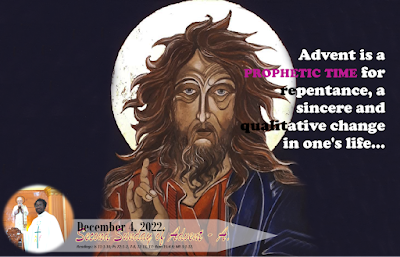THE PROPHETIC TIME.
January 31, 2021
Fourth Sunday in Ordinary Time - B.
Readings: Dt 18:15-20; Ps 95:1-2, 6-7, 7-9; 1 Cor 7:32-35; Mk 1:21-28.
A Jewish proverb says, “The complete fool
is half prophet.” And a Swahili proverb adds, “If you are astonished at Moses'
deeds, you will be more astonished at Pharaoh's.”
“I will raise up for them a prophet…” To
every period of time its prophets. To every epoch the persons it needs. God
always raises people for each season and period of life. From Adam, at the
first epoch of the creation to Abraham, Moses, Eli, David, Jesus, the Apostles,
and us today, the people are peoples of their epoch and their time and raised
by God for a corresponding mission.
We live today in a world and in societies,
where we could say, we have the people corresponding to our time and needs.
Someone went further saying, every people and country has the leaders it
deserves. So too, we have and we are the people of our time. Nevertheless, this
time is also called to be a prophetic period. People are called to see the Lord
at work in their midst through the mediation of their brothers and sisters,
raised from among them.
Today’s liturgy turns around the topic of a
prophet for a time. The conclusion and summarizing theme could be "Jesus
the prophet of our time or the expected prophet". And if our Lord is
presented and accepted as the expected prophet, we, his followers are as well
invested with a prophetic mission.
To the people of Israel in search of
identity and direction in the desert, the Lord, through his servant and prophet
Moses, announces that he will raise from among them a new prophet. This promise
of the Horeb was consecutive to the request of the people to no longer hear the
Lord speak by himself to them. They have been frightened by the voice of the
Lord and the events of his apparition at the Horeb. Therefore, they prefer
mediation with him instead of face-to-face communication.
The promise made by God through Moses to raise
a prophet from among his people will actually meet its completion with Jesus,
the great prophet, the expected one. He came with power and authority to do
God’s will and lead to him a new people eager to listen to him. In today’s
Gospel passage, Jesus is described as that great prophet who teaches with
authority and works wonders for the people. The amazement of the public about
him is well expressed by St. Mark: “What is this? A new teaching with
authority. He commands even the unclean spirits and they obey him.”
Our Lord Jesus is a great prophet. He has
authority over everything. And not only does he work wonders and release man
from the power of evil, but he has also brought about a newness, new teaching.
He is the perfect expression of God’s proximity with his people. God speaks to
us in a way that does not frighten but amazes us. If the theophany of the Horeb
frightened the people and made them renounced to hear God speak by himself to
them, today, with Jesus, the crowd runs from anywhere to listen to God and
touch him. He has the power to purify and set man free from the supremacy of
the devil.
In order for man to communicate rightly
with God and enter his newness, Paul in the second reading presents some
requirements: to give primacy to the affairs of the Lord. Paul exposes here an
example of a new doctrine that could contrast many of our today’s doctrines:
The singularly new value attributed to virginity. We are taught that factual
virginity is lived and practiced for the love and service of others. Those who
live in purity of body and heart have more time to truly love and think of
others. People attached to their body and its pleasures and feelings have no
time for others. Instead, they see in them instruments to satisfy the beating
and needs of their body.
Many people live today in sexual disorder
and sensuality. These have no love for others, but see them only as instruments
to answer to their sexual needs. For those who want pleasure at any cost, the
brother exists only as an object of their sexuality. We live, unfortunately, in
a world where selfishness and pleasure have widened their dictatorship. We do
everything with anxieties and as slaves of our feelings and body. Many are
anxious about money, power, and pleasure. All their thirst is for worldliness.
Paul, in today’s second reading, exhorts us to do away with all that is worldly
affaire and embrace Godliness, to live for God instead of living for the body
and the world.
Our world, today, needs prophets of
Godliness. People who will give more concern and primacy to the relationship
with God than to external matters. Jesus became the great prophet with
particular authority and power because he did all for God, with undivided
devotion. As his disciples, may we live with undivided hearts, fully consecrated
body and soul to God. In so doing, we will be prophetic signs for this world
where sexuality and pleasure, power and authority, selfishness and narcissism
reign undividedly and undefeated.





Comments
Post a Comment